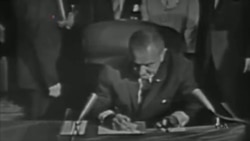ເມື່ອ 50 ປີກ່ອນ ບັນດາສະມາຊິກສະພາ ໄດ້ໃຫ້ການອະນຸມັດ
ແລະ ປະທານາທິບໍດີສະຫະລັດ ທ່ານ Lyndon Johnson ກໍ
ໄດ້ລົງນາມ ໃນຮ່າງ ກົດໝາຍວ່າດ້ວຍສິດທິໃນການປ່ອນ ໃນ
ປີ 1965. ມາດຕະການດັ່ງກ່າວໄດ້ເຮັດໃຫ້ການຈຳແນກກີດ
ກັນທາງດ້ານເຊື້ອຊາດຜິວພັນໃນການປ່ອນບັດ ເປັນ ການຜິດ
ກົດໝາຍແລະສະໜອງການຄຸ້ມຄອງທີ່ຈຳເປັນຕ່າງໆຂອງລັດ
ຖະບານ ກາງ ເພື່ອອະນຸຍາດໃຫ້ຊາວອາເມຣິກັນ ເຊື້ອສາຍ
ອາຟຣິກາ ຫລາຍລ້ານຄົນທີ່ ຢູ່ໃນຫລາຍເຂດ ທາງພາກໃຕ້
ຂອງສະຫະລັດສາມາດໄປຊົມໃຊ້ສິດທິໃນການ ປ່ອນບັດ
ຂອງພວກເຂົາເຈົ້າ. ກົດໝາຍດັ່ງກ່າວໄດ້ມີການຮັບຮອງເອົາ
ຫຼັງຈາກ ມີການປະທ້ວງການກໍ່ຄວາມບໍ່ສະຫງົບ ແລະການ
ນອງເລືອດເປັນເວລາຫຼາຍປີ. ນັກຂ່າວວີໂອເອ Chris Sim-
kins ມີລາຍງານກ່ຽວກັບເລື້ອງນີ້ ຊຶ່ງ ກິ່ງສະຫວັນ ຈະນຳມາ
ສະເໜີທ່ານ.
ປະຫວັດສາດ ໄດ້ເກີດຂື້ນເວລາ ປະທານາທິບໍດີ Lyndon Johnson ລົງນາມໃນຮ່າງ
ກົດໝາຍວ່າດ້ວຍສິດທິການປ່ອນບັດ ໃນປີ 1965. ກົດໝາຍ ດັ່ງກ່າວໄດ້ຖືກພິຈາລະນາ
ຢ່າງກວ້າງຂວາງວ່າ ເປັນກົດໝາຍໄດ້ຜົນທີ່ສຸດໃນ ບັນດາຮ່າງກົດໝາຍວ່າສິດທິພົນລະ
ເມືອງ ທີ່ໄດ້ປະກາດໃຊ້ຢູ່ໃນສະຫະລັດ.
ປະທານາທິບໍດີ Johnson ກ່່າວວ່າ “ພວກເຮົາຈະບໍ່ຫັນເຫໄປທາງໃດຈົນກວ່າ ຊາວ
ອາເມຣິກັນ ທຸກເຊື້ອຊາດເຜົ່າພັນ ທຸກສີແລະທຸກຕົ້ນຕໍທີ່ມາ ຢູ່ໃນປະເທດນີ້ ໄດ້
ຮັບສິດເທົ່າທຽມກັນ ເໝືອນດັ່ງຄົນອື່ນໆ ເພື່ອແບ່ງປັນການດຳເນີນຂັ້ນຕອນ
ຂອງປະຊາທິປະໄຕ.”
ກົດໝາຍສິດທິໃນການປ່ອນບັດ ໄດ້ທັບມ້າງການກີດກັ້ນຕ່າງໆຂອງ ລັດ ແລະທ້ອງຖິ່ນ
ຢູ່ຕາມໜ່ວຍປ່ອນບັດຂອງບັນດາປະຊາຄົມໃນທົ່ວພາກໃຕ້ ທີ່ມີການ ຈຳແນກກີດກັນ
ທາງດ້ານຜິວພັນຕໍ່ບັນດາຜູ້ມີສິດປ່ອນບັດ ຊາວອາເມຣິກັນເຊື້ອສາຍອາຟຣິກາ. ນອກ
ນັ້ນມັນຍັງໄດ້ສະໜອງການຄຸ້ມຄອງໂດຍລັດຖະບານກາງ ພາຍໃຕ້ບົດແກ້ໄຂລັດຖະທຳ
ມະນູນມາດຕາ 15 ຂອງສະຫະລັດ ທີ່ໄດ້ໃຫ້ສິດທິໃນການປ່ອນບັດແກ່ຊາວອາເມຣິກັນ
ເຊື້ອສາຍອາຟຣິການັ້ນ.
ສະມາຊິກສະພາຕ່ຳ John Lewis ກ່າວວ່າ “ກົດໝາຍວ່າດ້ວຍສິດທິໃນການປ່ອນ
ບັດປີ 1965 ໄດ້ເຮັດໃຫ້ມີສິດເສລີພາບ ແລະປົດປ່ອຍຜູ້ຄົນ ເປັນຈຳ ນວນຫຼວງ
ຫລາຍ.”
ທ່ານ John Lewis ປັດຈຸບັນນີ້ເປັນສະມາຊິກສະພາຕ່ຳ ເກືອບເສຍຊີວິດໃນລະຫວ່າງ
ການເດີນຂະບວນ ຮຽກຮ້ອງເອົາສິດທິການປ່ອນບັດທີ່ເມືອງ Selma ລັດ Alabama ໃນ
ປີ 1965. ພາບຂອງຄວາມຮຸນແຮງແລະການປະເຊີນໜ້າກັນ ທີ່ຕຳຫລວດໄດ້ໂຈມຕີພວກ
ປະທ້ວງ ທີ່ພາກັນເດີນຂະບວນແບບສັນຕິ ໄດ້ເຮັດໃຫ້ມີການຄັດຄ້ານຢູ່ໃນທົ່ວປະເທດ
ແລະໄດ້ນຳໄປສູ່ການຮັບຮອງເອົາກົດ ໝາຍປ່ອນບັດດັ່ງກ່າວ.
ສະມາຊິກສະພາຕ່ຳ Lewis ກ່າວວ່າ “ມັນມີຄຸນຄ່າທີ່ດີພໍ ສົມກັບທີ່ຫລາຍໆຄົນໄດ້ຮັບ
ຄວາມທຸກທໍລະມານ. ມັນມີຄຸນຄ່າສົມກັບເລືອດເນື້ອ ທີ່ພວກເຮົາໄດ້ເສຍສະຫຼະ
ໄປນັ້ນ.”
ອາຈານສອນລັດຖະສາດການເມືອງ ທ່ານນາງ Andra Gillespie ກ່າວວ່າ ການດຳເນີນ
ຄວາມຍາຍາມສ່ວນໃຫຍ່ຂອງລັດຖະບານ ໄດ້ເລີ້ມດ້ວຍການລົງ ທະບຽນບັນດາຜູ້ມີສິດ
ປ່ອນບັດຊາວອາເມຣິກັນເຊື້ອສາຍອາຟຣິກາ.
ທ່ານນາງ Gillespie ຈາກມະຫາວິທະຍາໄລ Emory ກ່າວວ່າ “ອັດຕາການປ່ອນບັດ
ຂອງຊາວອາເມຣິກັນເຊື້ອສາຍຟຣິກາ ໄດ້ເພີ້ມຂື້ນຢ່າງຫລວງຫລາຍ ໃນລະຫວ່າງ
ຕອນທ້າຍຂອງຊຸມປີ 1960 ແລະຕອນຕົ້ນຊຸມປີ 1970. ເພາະສະນັ້ນ ໄດ້ມີຫຼາຍໆເຂດຢູ່ໃນພາກໃຕ້ລັດຕ່າງໆຊຶ່ງເປັນລັດບ່ອນທີ່ຊາວອາເມຣິກັນ ເຊື້ອສາຍອາຟຣິ
ກາ ຫລາຍໆພັນຄົນສາມາດໄປປ່ອນບັດ.”
ບັນດາຜູ້ນຳຊາວອາເມຣິກັນເຊື້ອສາຍອາຟຣິກາ ກ່າວວ່າ ການເສຍສະລະທີ່ໄດ້ເຮັດໄປ
ເພື່ອໃຫ້ໄດ້ຮັບສິດທິໃນການປ່ອນບັດນັ້ນ ສົມຄວນທີ່ຈະສະຫລອງ ແລະບໍ່ໃຫ້ຫລົງລືມ.
ທ່ານ Leo Smith ທີ່ກຳກັບນຳການພົວພັນຊົນກຸ່ມນ້ອຍຂອງພັກຣີພັບບລິກັນ ໃນລັດ
Georgia ກ່າວວ່າ “ຂ້າພະເຈົ້າ ປື້ມປິຕິຍິນດີ ທີ່ພວກເຮົາໄດ້ໜີຈາກສັງຄົມບ່ອນທີ່ ຂ້າພະເຈົ້າອາດຖືກໂຈມຕີ ແລະທຸບຕີຄືດັ່ງ ທ່ານ John Lewis ໄດ້ຖືກນັ້ນ. ທ່ານ
ໄດ້ຮັບບາດແຜເຫລົ່ານັ້ນສຳລັບຂ້າພະເຈົ້າ. ຢ່າໄດ້ເສຍເລືອດເນື້ອໄປລ້າໆທີ່ໄດ້
ຢົດໄຫລອອກມາ ໂດຍການເຮັດແບບ ບໍ່ຮູ້ວ່າ ຄວາມທຸກທໍລະມານຂອງທ່ານນັ້ນ
ບໍ່ໄດ້ມີຄວາມໝາຍໃດໆ.”
ຫ້າສິບປີຕໍ່ມາ ອະດີດຜູ້ປົກຄອງນະຄອນ Atlanta ທ່ານນາງ Shirley Frankin ຈື່ໄດ້ວ່າ
ກົດໝາຍວ່າດ້ວຍສິດທິໃນການປ່ອນບັດ ໄດ້ເຮັດໃຫ້ທ່ານນາງ ມີໂອກາດໄດ້ລົງສະໝັກ
ແຂ່ງຂັນເລືອກຕັ້ງ.
ທ່ານນາງ Frankin ກ່າວວ່າ “ເປັນຈັ່ງໂຊກ ທີ່ຄົນອຶ່ນໆໄດ້ເຫັນບາງສິ່ງບາງຢ່າງໃນ
ໂຕຂອງຂ້າພະເຈົ້າ ທີ່ຂ້າພະເຈົ້າບໍ່ເຫັນດ້ວຍຕົວເອງ. ເຂົາເຈົ້າໄດ້ໃຫ້ກຳລັງໃຈ
ແກ່ ຂ້າພະເຈົ້າກ້າວອອກມາຈາກບ່ອນທີ່ຂ້າພະເຈົ້າໄດ້ຢູ່ຢ່າງສະໜຸກສຸກສະ
ບາຍເພື່ອລົງສະໝັກເລືອກຕັ້ງ. ພາລະກິດຂອງຂ້າພະເຈົ້າ ນັບແຕ່ເວລານັ້ນມາ ແມ່ນໄດ້ຊັກຊວນໃຫ້ບຸກຄົນອື່ນໆເຮັດເຊັ່ນດຽວກັນ.”
ບັນດານັກວິເຄາະການເມືອງ ກ່າວວ່າ ກົດໝາຍວ່າດ້ວຍສິດທິໃນປ່ອນບັດ ໄດ້ເປັນໄຊຊະ
ນະສຳລັບປະເທດຊາດ ໂດຍທີ່ໄດ້ເຮັດໃຫ້ເປັນເຄຶ່ອງມືທີ່ມີອິດທິພົນທີ່ສຸດອັນນຶ່ງ ໃນລະ
ບອບປະຊາທິປະໄຕ ນັ້ນກໍຄືການປ່ອນບັດ ທີ່ທ່ຽງທຳແລະຖືກຕ້ອງ.
Fifty years ago, lawmakers approved, and U.S. President Lyndon Johnson signed, the Voting Rights Act of 1965. The measure outlawed racial discrimination in voting and provided the necessary federal enforcement to allow millions of blacks in many parts of the southern United States to exercise their right to vote. The law followed years of protests, civil unrest and bloodshed.
The law is widely considered to be the most effective piece of civil rights legislation ever enacted in the United States.
"We will not turn aside until Americans of every race and color and origin in this country have the same right as all others to share in the process of democracy," said President Lyndon Johnson.
The Voting Rights Act wiped out state and local barriers at the ballot box in communities throughout the South that racially discriminated against black voters. It also provided for federal enforcement of the 15th amendment of the U.S. Constitution, which gave African Americans the right to vote.
"The [Voting Rights] Act of 1965 freed and liberated so many people," said John Lewis, a U.S. Congressman.
Lewis was nearly killed during a voting rights march in Selma, Alabama in 1965. Scenes of the violent confrontation, in which police attacked peaceful demonstrators, caused a national outcry and led to swift passage of the Voting Rights Act.
"It was worth the suffering of so many people. It was worthy of the blood that some of us gave," he said.
Political science professor Andra Gillespie said large-scale government-backed efforts were launched to register black voters.
"The voting rate among African Americans climbs exponentially during the latter part of the 1960s and early part of the 1970s. So there were places in the South, states where hundreds or thousands of blacks could vote," said Gillespie.
Black leaders say the sacrifices made to win voting rights should be celebrated and never forgotten. Leo Smith directs minority engagement for the Georgia Republican Party.
"I am proud that we have gone from a society where I might have been attacked and beat down like John Lewis was. He took those wounds for me. Don't waste the blood that was spilled by pretending that his suffering meant nothing," said Smith.
Fifty years later former Atlanta Mayor Shirley Franklin remembers how the 1965 Voting Rights Act gave her an opportunity to seek elective office.
"Fortunately other people saw something in me that I didn't see in myself. They encouraged me to step out of my comfort zone and to run for office. My mission since that time has been to encourage people to do the same," said Franklin.
Political analysts say the Voting Rights Act was a victory for the nation by making one of the most powerful instruments in a democracy -- the vote -- fair and equitable.





